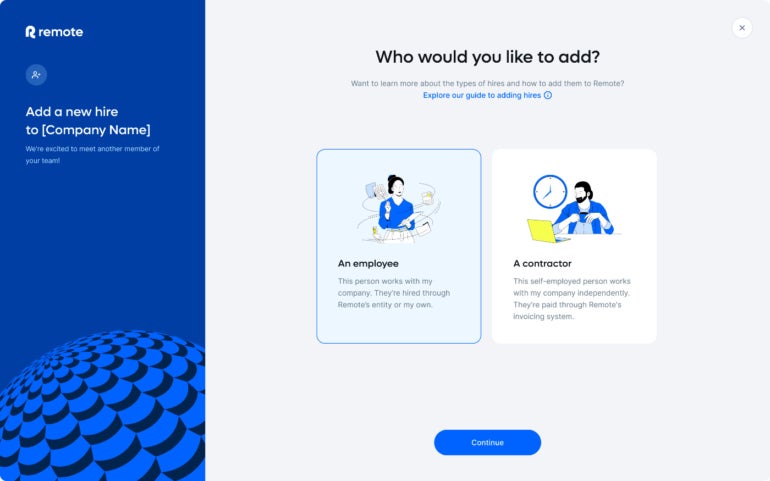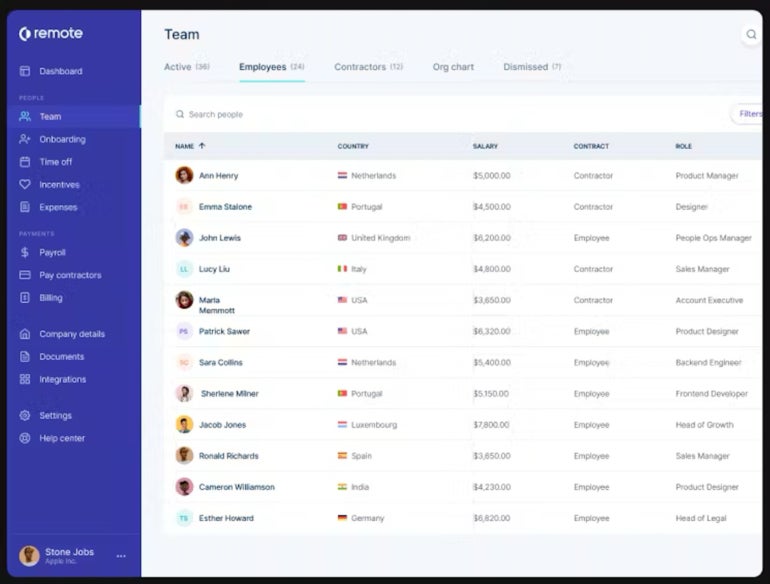Not sure what an employer of record does? We explain what it is, what it covers and why you may want to team up with one.
An employer of record can greatly simplify hiring and paying an employee in a new state or location. By using an EOR, businesses can free up time and resources and shield themselves from compliance and legal risk. In this guide, we’ll deep dive into what exactly an employer of record does and why you might want to work with one if you plan to expand internationally.
Jump to:
What does an EOR do?
An EORis a third-party organization that acts as the full legal employer of an employee while they do work for another company. An EOR assumes employment responsibilities, legal risks and compliance responsibilities. It hires employees, executes payroll, administrates benefits and manages other HR functions on your behalf.
What are the benefits of using an EOR?
Working with an EOR offers numerous potential benefits for businesses looking to hire internationally. Here’s what you can expect when working with EOR providers.
Faster setup and onboarding
Establishing your own legal entity in a different state or country can be a very complex and time-consuming process. By working with an EOR that’s established in your location of choice, you can quickly hire and onboard new employees (Figure A). This speeds up the entire process and helps your company expand faster.
Figure A

Cost savings
Creating a legal entity isn’t just time consuming — it’s expensive as well. In most cases, using an EOR is more affordable than establishing a separate legal entity and hiring the extra staff to administer HR and ensure legal compliance. This is especially true if you only need to hire a few employees to start.
Minimized compliance risk
Because the EOR is technically the employer, it assumes all the legal risk on behalf of your company, shielding your business from potential repercussions. EORs usually have in-house experts who stay updated on local labor laws, ensuring your company stays compliant with the most recent changes.
Outsourced HR services
Keeping HR functions in house will probably require hiring and training extra staff (or adding even more tasks to your current worker’s plates). Working with an EOR allows you to outsource HR work to a third party, leaving your in-house HR staff free to spend their time on more valuable tasks.
Attract and retain talent
Partnering with an EOR can make it easier for your business to attract and retain top talent in other states and countries. Because they’re familiar with local laws and customs, an EOR will help you put together a competitive compensation package that will encourage candidates to accept your offer and stay with the company longer (Figure B).
Figure B

SEE: A Complete Guide to Payroll Software
What is the difference between an EOR and a PEO?
You might see the terms EOR and PEO used together a lot, but these are technically two separate arrangements. PEO stands for professional employer organization, and it requires you to own your own legal entity in the country or region you plan to operate in. With a PEO, you’re legally responsible for staying compliant with all relevant labor laws.
When working with a PEO, you have a coemployment arrangement with the partner company. The PEO handles HR tasks, such as payroll and benefits, while your company remains the legal employer. A PEO may be a good choice if you already have a legal entity established in the country or state where you plan to hire. If you don’t already have a legal entity established, then working with an EOR will almost certainly be faster and more affordable.
SEE: The Best PEO Companies of 2023
Do I need an EOR?
You will need an employer of record if you want to hire employees in a new state or country, and you don’t plan to establish a legal entity of your own. EORs are an especially good choice if you only need to hire a few employees or hire international employees on a temporary basis. Basically, any scenario where you need to hire employees in another state or country — but can’t justify setting up your own legal entity — is a good option for an EOR.
Working with an EOR might also make sense if you need to onboard new employees quickly, even if you plan to eventually set up a PEO or fully employ workers on your own. You can use the EOR as a stop-gap measure until your legal entity is up and running. Some EOR services even allow you to switch from an EOR to a PEO or vice versa, making everything seamless.
Looking for an EOR solution?An EOR is a cost-effective, scalable and secure way to hire employees in other countries. So if that’s everything you’re looking for, consider Remote, a popular option in the EOR space. It has entities in over 170 countries and provides clients with localized HR support. |
How to select an EOR solution
The most important thing to consider is whether or not the EOR solution operates in the states or countries where you plan to hire. Not all EORs operate in all locations, so you need to look for EORs that are available where you plan to hire. Think about not only your immediate needs but also the countries you might want to expand to in the future.
You’ll also want to consider whether the EOR solution operates their own entities (Remote does this, for example) or partners with third-party organizations that are already functioning in that country (which Papaya Global does). The latter can lead to a rather fragmented experience if you plan to hire in multiple countries. However, if the EOR only operates their own entities, you may be limited to the countries it’s available in, or it could drive up the cost of the service.
We also recommend choosing an EOR that has a reputation for responsive customer service. Hiring international employees is a complex process, and you need to be able to get a hold of support quickly if you encounter any obstacles or have a question.
Some EOR services, such as Remote, offer other functions, such as payroll and HR software, which can be useful if you want to keep everything in one system. For instance, you can use the software to run payroll for U.S.-based employees on your own and use the EOR services branch to hire international employees, all within the same platform. However, this might not matter to you if you already have payroll and HR software you’re satisfied with.
If you’re not sure you’re quite ready for an EOR but are looking for a payroll or HR solution, check out our guide for how to choose payroll software or our list of the best HR software of 2023.
Featured HR solutions
Source of Article



